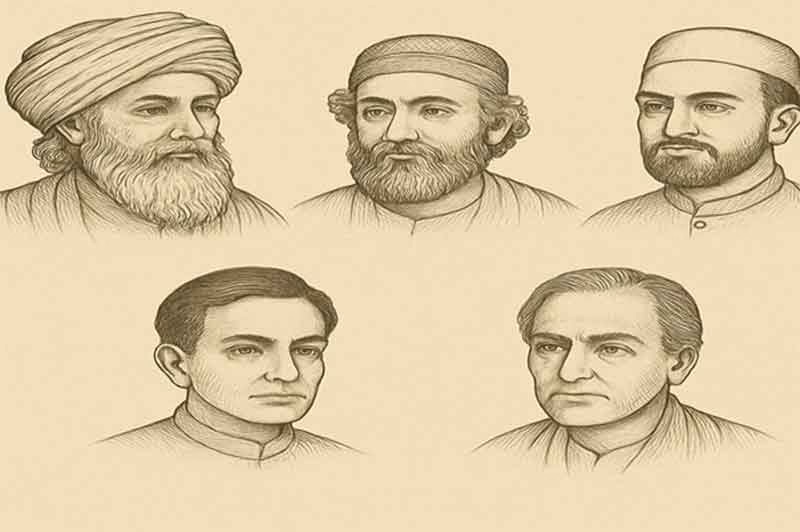
The land of Sindh is not only significant for its geography or history; it is a wellspring of the Indian subcontinent’s cultural and spiritual consciousness. Sindh’s poetic heritage—especially its Sufi tradition—stands as a timeless testament to love, spiritual inquiry, and social justice. The poets of Sindh transcended religious boundaries, temporal limits, and political borders to craft a resonant voice that continues to echo in the hearts of people today.
Shah Abdul Latif Bhittai (1689–1752)
Widely revered as the greatest Sufi poet of Sindh, Shah Abdul Latif Bhittai’s contributions to literature are unparalleled. His magnum opus, Shah Jo Risalo, is considered the soul of Sindhi literature. Through local folklore, devotional mysticism, and lyrical grace, he sang of the soul’s yearning for union with the divine. His verses—rooted in simplicity yet rich with metaphysical depth—have captured the imagination of generations.
“In Momal’s tale, the heart was wounded,
With a single glance, the soul surrendered.”
His poetry illustrates the universality of love and longing, bridging the spiritual with the worldly.
Sachal Sarmast (1739–1829)
Known as the “Second Shah” of Sindhi poetry, Sachal Sarmast was a fierce advocate of love, universality, and inner freedom. A polyglot, he composed in Sindhi, Persian, Urdu, and Punjabi, effortlessly weaving a tapestry of inclusive mysticism. He stood in stark opposition to religious dogma and sectarianism, calling instead for a deeper understanding rooted in love.
“Neither Hindu, nor Muslim—Sachal knows only the self,
He alone is wise, in whose heart dwells love.”
Sachal’s voice was not only poetic but also rebellious—a gentle defiance of all that divides.
Makhdum Nooh (16th Century)
Among the early voices of Sindhi Sufi poetry, Makhdum Nooh remains a pivotal figure. His verses emphasized morality, spiritual discipline, and unwavering faith. While less known in the global canon, his influence laid the foundation for centuries of mystical thought in the region.
“Allah’s name is a sacred gift—
Guard it always, forget it never.”
His poetic simplicity spoke directly to the common people, embedding spiritual values into daily consciousness.
Akbar Lakhnavi (20th Century)
Akbar Lakhnavi introduced a modern sensibility to Sindhi poetry through the ghazal form. His poetry reflected urban alienation, romantic longing, and the silent ache of solitude. He brought the depth of classical Urdu poetry into the Sindhi literary sphere, crafting verses that resonated with contemporary emotional landscapes.
“Desires still smoulder deep within the heart,
Unextinguished, even in the nightfall of age.”
Through his melancholic yet elegant expression, Akbar captured the intimate, unspoken truths of the soul.
Shaikh Ayaz (1923–1997)
Shaikh Ayaz is often hailed as the voice of modern Sindhi poetry. A poet of resistance and dignity, Ayaz wrote about social injustice, cultural pride, and the longing for freedom. His poetry gave language to a generation’s aspirations, expressing both personal and collective struggles.
“I am the soil, I am the flame,
I am Sindh, I am the song.”
Ayaz’s defiant humanism and rooted identity made him not just a poet but a symbol of Sindhi consciousness in the postcolonial era.
Sindhi Poetry: A Shared Inheritance
The works of these poets are more than literary artifacts—they are the soulprints of time. Fusing Sufi philosophy with folk narratives and music, they carved a literary tradition that broke through linguistic and communal barriers. Their verses championed the dignity of women, the ideal of social equality, the right to faith, and the power of compassion.
Before the Partition of 1947, Sindhi poetry was part of a shared Indo-Pakistani heritage. Today, these verses continue to serve as a cultural and spiritual bridge between the two nations. They remind us that when literature speaks in the language of love, truth, and resistance, it never fades—it becomes immortal.
The legacy of Sindh’s poets compels us to remember: in a fractured world, poetry can still be a unifying force, echoing across borders, generations, and hearts.
Subscribe to Our Newsletter
Get the latest CounterCurrents updates delivered straight to your inbox.
Ashish Singh has finished his Ph.D. coursework in political science from the NRU-HSE, Moscow, Russia. He has previously studied at Oslo Metropolitan University, Norway; and TISS, Mumbai.













































